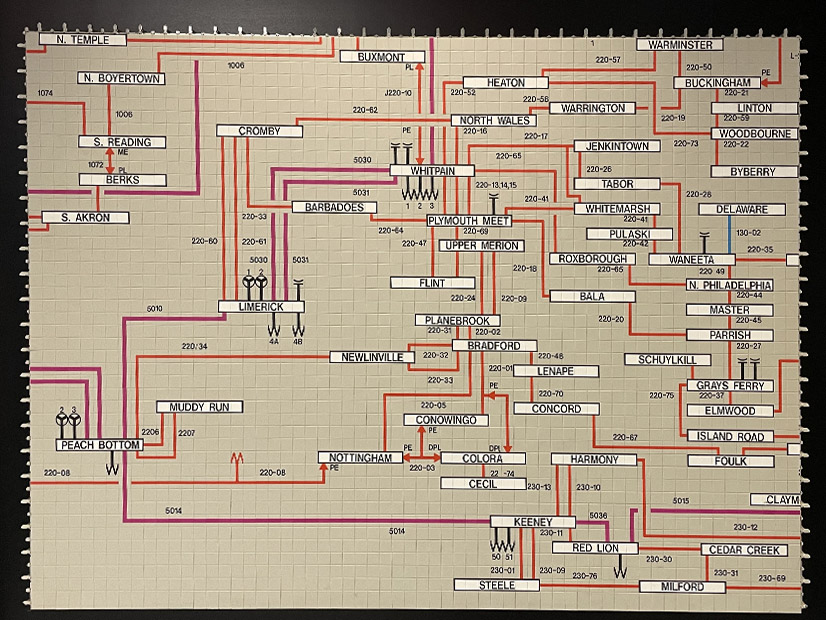Consumer advocates, industrial consumers and municipal utilities asked FERC on Tuesday to force PJM to require incumbent transmission owners to sign designated entity agreements (DEA) on “immediate need” projects, contending the RTO has violated its Operating Agreement by refusing to do so.
The complaint by American Municipal Power, the D.C. Office of the People’s Counsel and the PJM Industrial Customer Coalition came the day before PJM stakeholders were scheduled to vote on whether to open an initiative over the dispute.
The Markets and Reliability Committee was scheduled to have stakeholders vote between an issue charge proposed by consumer advocates and one by TOs after negotiations between the two groups failed to reach an agreement over whether the initiative could consider changes to the rights and responsibilities of PJM and the TOs under the Consolidated Transmission Owners’ Agreement. (See PJM TOs, Consumer Advocates at Odds over DEA Inquiry.)
The MRC agenda also gave notice that PJM “anticipates” making a Federal Power Act Section 206 filing with FERC asserting that the OA is unjust and unreasonable regarding its implementation of DEAs. “The specific course of action depends in part” on how the MRC resolves the issue charge.
After the filing of the stakeholders’ complaint, however, PJM amended the MRC agenda to cancel the vote, saying the issue would be discussed tomorrow at the Members Committee meeting.
PJM also amended the MC agenda to give the committee “notice of consultation” of a potential filing under FPA Section 205 to revise the pro forma DEA in Attachment KK of its tariff.
PJM did not immediately respond to a request for comment on the complaint. In an August 2021 letter responding to questions about the RTO’s adherence to the OA, however, PJM CEO Manu Asthana said the RTO had “determined that the Operating Agreement language could be read in a way that is not fully aligned with PJM’s practice for the last seven years or, in PJM’s view, the rationale behind issuing a DEA in the first instance. That is, the DEA was developed to apply only to projects that are selected through PJM’s Order No. 1000-compliant competitive window process and included in the Regional Transmission Expansion Plan (RTEP) for regional cost allocation purposes.”
2018 Order
The current dispute dates back to at least 2018, when FERC rejected PJM’s request to revise the OA to waive the DEA for RTEP projects that the OA requires PJM to designate to an incumbent (ER18-1647). Such projects include TO upgrades; projects that would alter the TO’s use of its right of way; and those located solely within a TO’s zone that are not cost allocated outside. (See FERC Rejects PJM Exemption for Incumbent TOs.)
In rejecting the TOs’ rehearing request in 2019, FERC said that breaching a DEA is more expensive for nonincumbent TOs, which are subject to meeting construction milestones that may be delayed for reasons beyond their control, while incumbent TOs only risk breaking the terms of a CTOA by missing scheduled in-service dates.
Unlike incumbents, nonincumbents must also “obtain a letter of credit or other financial instrument equal to 3% of the incremental project cost in the event of a breach,” meaning this extra cost must factor in project submissions, making the incumbent TO’s proposal cheaper by default, FERC said. (See Rehearing Denied on PJM Designated Entity Agreements.)
Feb. 2022 Policy Change
In the complaint filed Tuesday — which was not immediately assigned a docket number — the stakeholders alleged that PJM for years had only required execution of a DEA for projects selected through a competitive window under Order 1000 that were regionally planned and subject to regional cost allocation.
In February 2022, the stakeholders said, PJM began requiring DEAs for TO-designated projects selected through the proposal window that were not regionally allocated. “However, PJM persists in only partially complying with Operating Agreement section 1.5.8 because PJM is not requiring execution of a designated entity agreement for all regionally planned projects, including immediate-need reliability projects and those resulting from needs that are not posted in a competitive window,” the complaint says.
The complaint asks FERC to order PJM to execute DEAs for about 494 regionally planned projects that have been approved by the RTO’s Board of Managers and are still under construction. PJM has executed only five DEAs, two with incumbent TOs and three with nonincumbents, the stakeholders said.
The complainants said the DEA, which includes requirements that designated entities adhere to scheduling milestones, is “particularly relevant” for time-sensitive immediate-need reliability projects. It cited a 2021 PJM informational filing that reported about 50 immediate-need projects’ anticipated in-service dates would be after their need-by date.
“If there were designated entity agreements in place for these projects, then PJM would be required to re-evaluate the projects to determine whether a different project is needed,” the complaint said.
The complainants said the DEA can also provide cost transparency. “For example, at an April 2021 PJM Transmission Expansion Advisory Committee meeting, Alleghany Power Systems revised the cost estimate for an immediate-need reliability project assigned to it from $41.4 million to $143.4 million, an increase of $102 million, or 246%. Contrary to the express provisions of the currently effective Operating Agreement, there is no designated entity agreement in place for this project,” it said. “If there was, PJM likely would have [re-evaluated] the project earlier and revised the project at that time and perhaps identified a less costly solution that would not have increased the price tag by $102 million.”




